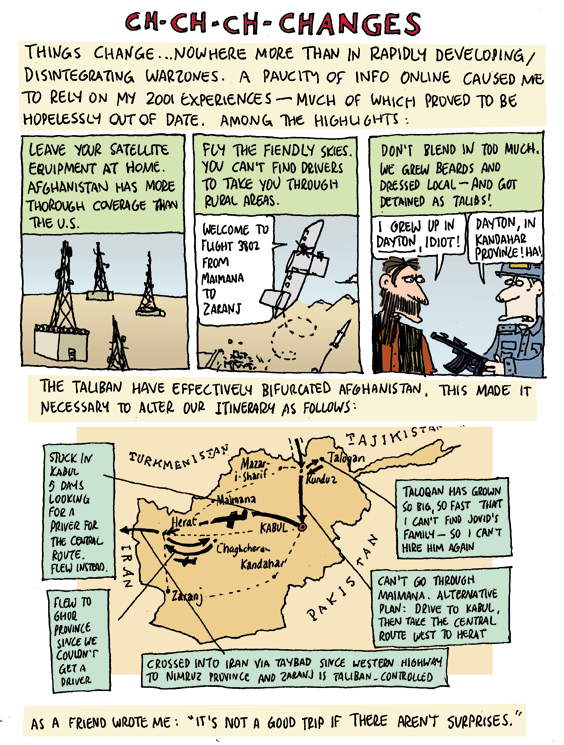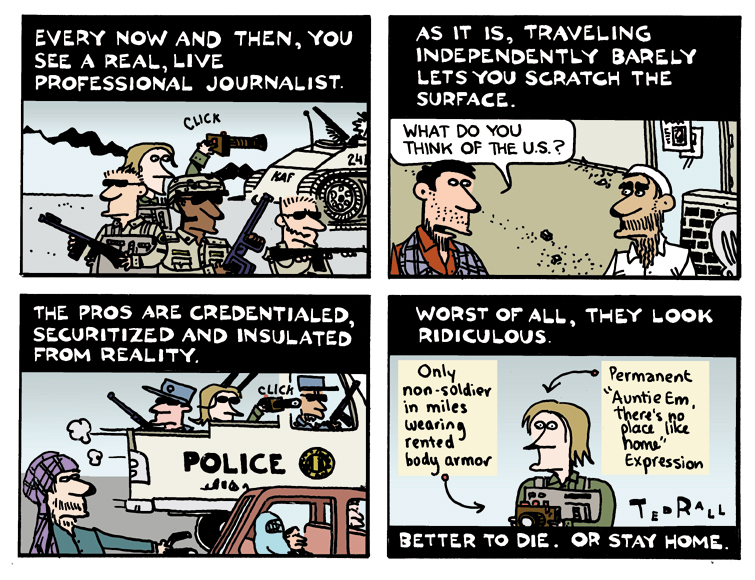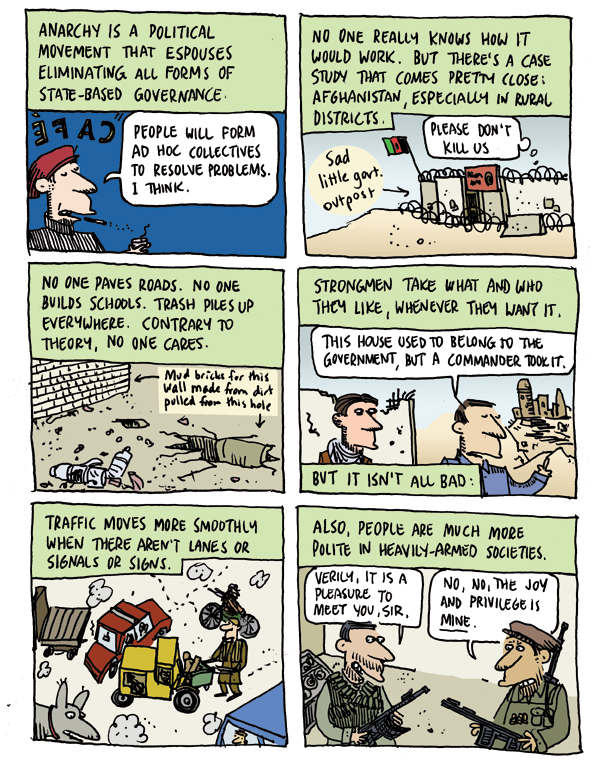Live Radio with Matt Bors and I
Check out our live interview for one hour starting at noon Pacific time/3 pm Eastern on KPFK. It’s live-streamable at http://www.kpfk.org. We’re taking calls too.
SYNDICATED COLUMN: Afghan War Lies
Support for Occupation Relies on Lies and Spin
There’s an exception. It is a limited set of circumstances. If the armies of another nation invade your country, there is no need to resort to lies to sell war. The battle is already joined. The threat is palpable. Anyone with a smidgen of patriotism and/or the instinct of self-preservation will rush to enlist.
Mostly, this does not happen. It sort of happened in 1941, with Pearl Harbor. But Hawaii, itself recently seized by U.S. marines without the thinnest veneer of legality, was merely a distant possession. It sort of happened in 1848 when Mexican troops crossed the Rio Grande (after being deliberately provoked by the Americans). It definitely happened in 1812. But you see the point: every war the United States has fought, at least since 1945 (really since 1814), has been just for fun.
Korea, Vietnam, Grenada, Panama, Gulf War I, Bosnia, Afghanistan and Iraq—the U.S. didn’t have to fight any of them. They were optional. At minimum, they were wars of imperialism. Mostly, they were wars of aggression: undeclared, immoral, violations of international law.
Lies and spin are essential tools of “leaders” who want to convince the public to support wars for fun and profit.
The war against Afghanistan is no exception. I have previously discussed the Big Lies about Afghanistan: 9/11 came out of Afghanistan, Al Qaeda’s training camps were there, bin Laden was there, oil has nothing to do with it, etc. Now let’s talk about the little lies.
Lie #1: The war could have been won.
You know the narrative: the Bush Administration never sent in enough troops, then “took their eye off the ball” by invading Iraq and transferring military resources there from Afghanistan.
The truth: More troops would merely have postponed the inevitable defeat, while costing more Afghan and American lives. Remember General Shinseki, fired for telling Congress that Iraq needed at least 300,000 to 400,000 U.S. troops to establish command and control? Afghanistan is about the same population and area as Iraq, but with much tougher terrain: some of the biggest, baddest mountains on the planet. U.S. forces would have had to permanently station at least 500,000 to 600,000 soldiers there. We didn’t have them. Still don’t.
Sure, we could run up the deficit even higher, hire and train more troops, and pack them off to the Hindu Kush. But Afghan resistance forces would wait us out. Even the U.S. military colossus can’t bleed forever. We would have to pare down. Then we’d be back where we are now: humiliated, defeated, broke, morally bankrupt.
Lie #2: Karzai isn’t perfect, but he’s the best of a bunch of bad alternatives.
The mainstream media began questioning America’s backing of the corrupt, incompetent and unpopular Karzai regime after he brazenly stole the most recent presidential election. But they refuse to call for the end of U.S. aid, or for fair elections. Mainly this is because they don’t know squat about Afghanistan. But there were always better alternatives.
The best option for a nation that pretends to promote democracy would have been to actually promote democracy. Let the Afghan people choose between any candidates they want—yes, including the Taliban—and pledge to work with the winner no matter what. (This is what the U.S. ought to have done after Hamas won the election in Gaza.) The definition of integrity is doing the right thing even when it hurts; that’s also what’s required of the U.S. when it’s playing Captain Democracy.
Moreover, there were always more palatable choices than Karzai. The exiled king, for example, was far more popular in 2001 than the dapper ex-Talib who fled the country after being accused of embezzlement.
Lie #3: We’ve got the right strategy/general now.
Now it’s Petraeus. Every time the White House shuffles the military brass, they claim that this time it’s different. The old strategy that didn’t work in 2004, or 2006, or whatever, is dead. We’ll use more drones. No, fewer drones. Wait, more.
No general, no matter how brilliant, can save a doomed military campaign. Anyway, neither Petraeus nor the other stuffed uniforms who’ve paraded in and out of Bagram in recent years are geniuses. Where are the Eisenhowers and Pattons of 2010? They’re hedge fund managers.
Lie #4: Nation-building wouldn’t have helped.
Bush promised a Marshall Plan for Afghanistan. Now Vice President Biden admits what Afghans have known all along: we’re not there to nation-build. We are there to nation break.
Nine years into America’s longest war, it’s painful to contemplate how the billions poured into Afghanistan—much of which has been siphoned off by Halliburton and other contractors, not to mention flown out of the country by the Karzai clan, might have been better spent.
In 2001 Afghans didn’t need much to lay the foundations for a viable nation-state. I asked them. The answers were always the same: they involved infrastructure. Good roads. Electricity. Running water. Government offices. Connect the country’s far-flung provinces to the capital, and Afghans would resume their historical role as traders. Security would necessarily follow commerce.
If we were determined to occupy Afghanistan after the 9/11 attacks, it ought to have been with construction equipment, not tanks. Even if the Taliban had come to power, it would have been hard for them to talk smack about the U.S. in a nation covered with road signs that read: “Unconditional Gift of the People of the United States to the People of Afghanistan.”
(Ted Rall has recently returned from Afghanistan to cover the war and research a book. He is the author of “The Anti-American Manifesto,” which will be published in September by Seven Stories Press. His website is tedrall.com.)
COPYRIGHT 2010 TED RALL
Washington Post Interview
Today’s Washington Post has a follow-up interview with me about my just-ended trip to Afghanistan.
Upcoming Public Appearances
A complete list of book tour dates is available on the Events tab. Here is the list of the next public appearances, which will be in the Northeast.
Friday, September 24th
NEW YORK
Brecht Forum
451 West Street
New York, NY 10014-2041
(212) 242-4201
Event begins 7:30pm
Saturday, September 25th
BALTIMORE
Radical Pavilion of the Baltimore Book Festival
Mount Vernon Place
600 Block North Charles Street
Baltimore, MD 21201
Time TK
Monday, September 27th
WASHINGTON DC
Busboys and Poets
2021 14th St. NW
Washington DC 20009
(in the Langston Room)
6:30
Tuesday, September 28th
PHILADELPHIA
Wooden Shoe Bookstore
704 South Street
Philadelphia, PA 19147
(215) 413-0999
7pm
Upcoming Radio Interviews
Check the Events tab for the long list of interviews and public appearances I’ll be doing to promote the Manifesto. Here are the next few radio interviews. You should be able to live-stream by clicking the various links. Don’t forget to adjust for your time zone.
Wednesday, September 22nd
KGNU Morning Show, Colorado
10:35am-11:30am East Coast time
Thursday, September 23rd
KOPN Chautauqua, Columbia, MO
6-7 pm Central time
Monday, September 27th
Riz Khan Show, Al Jazeera English
12:10-1pm East Coast time
Culture Shocks with Barry Lynn (Nationally Syndicated)
1:00-1:40 pm East Coast time





